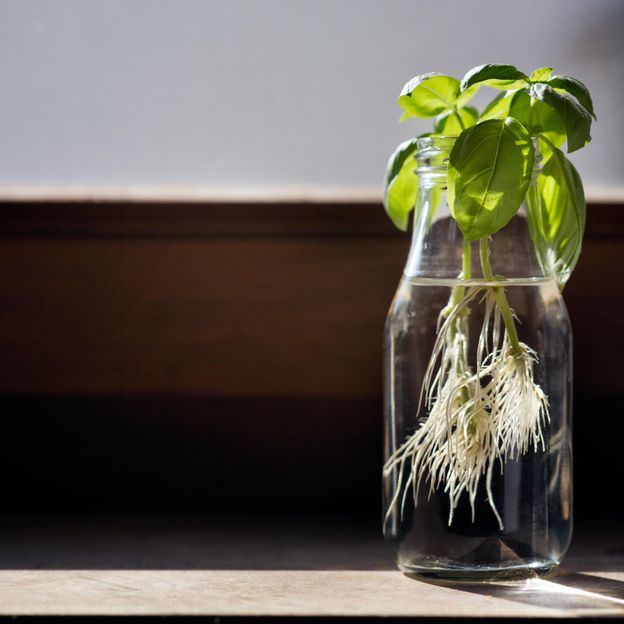Laura Beloff’s plant seemed to be clicking. She had rigged its roots up to a contact microphone in order to detect faint, high-pitched clicks in the soil. With the help of software she had written for her computer, the frequency of the clicks had been lowered, making them audible to humans.
As she worked at her desk, the plant apparatus next to her happily chattered away. And that’s when it happened. “This was the weirdest thing,” says Beloff, an artist and associate professor at Aalto University in Finland. A visitor came into her room, at which point the plant’s clicking stopped. When the visitor left, the clicking resumed. Later, more people arrived and, again, the clicking ceased. It only recommenced when the people departed. “I still don’t know what to think about it,” says Beloff.
It was as if the plant wanted a private audience with Beloff. As if it had been talking to her.
Beloff’s attempts to detect clicks emanating from plants lasted more than two years in total, on and off. She remains unsure about what was going on. Her equipment was low cost, a simple microphone that she acknowledges could have been picking up noise from microorganisms in the soil or other sources – not necessarily the plant. And to infer that the plant was communicating, or that it reacted to people entering the room, is speculation at this point.
But the possibility, the slightest chance, intrigued Beloff. “Is it really happening that way? That’s the question,” she says.
There is much about plants, and plant lives, that we don’t know. Currently, there is a debate among people who study plants regarding the extent to which flowers and shrubs can communicate with one another, or other living things. And if they can, does that make them intelligent?

Some plants do appear to respond to vibrations, chemical signals and sounds, but the idea they can “communicate” is controversial (Credit: Elva Etienne/Getty Images)
Scientific research is constantly yielding new discoveries about the intricacy of plants and their amazing abilities. There is a possibility that plants may be more complex than some have assumed. And yet the idea that they could be considered to be “talking” to humans is controversial.
That doesn’t stop some people trying to engage them in conversation, though. They are the plant whisperers.
Beloff first had the idea of listening to her plants’ roots after reading about experiments by Monica Gagliano and other researchers. Over the last decade or so, Gagliano, at the University of Western Australia, has published a series of papers that suggest plants have an ability to communicate, learn and remember.
She has long argued that scientists should pay greater attention to the fact that plants can transmit and retrieve information acoustically. In a 2017 study, Gagliano and colleagues showed that plants appear to be able to sense the sound of water vibrating via their roots, which may help them to locate it underground.
Gagliano is confident that plants can communicate. “The evidence is clear,” she says.
It was in a much-cited paper published in 2012 that she and her co-authors reported the detection of clicking noises from plant roots. The researchers used a laser vibrometer to detect these sounds right at the root tips. Gagliano says that the laser was trained on the roots when they were submerged in water in a lab setting, to help ensure that the detected sounds were indeed emanating from the roots themselves.
To say that those clicks have any communicative function requires further evidence, however. Gagliano says that she has observed plant roots responding to sounds at similar frequencies by changing their direction of growth.
Uncertainties as to what this means, exactly, remain. And Gagliano has also raised eyebrows with claims that, in non-experimental settings, she has heard plants speak to her using words.
She says that this experience is “outside the strictly scientific realm” and that a third-party observer would not be able to measure the sounds she heard with laboratory instruments. But she is quite certain that she has perceived plants speaking to her on multiple occasions.
“I have been in situations where not just me but several others in the same space heard the same thing,” she says.
Whatever you think of these claims, recent research by multiple scientific teams has been revealing an assortment of fascinating insights about plants and sound. Take the 2019 study by a group of researchers in Israel, for instance, which found that plants increase the amount of sugar in their nectar when they are exposed to the sound of a bee buzzing by.
Plants might do this in order to reward insects, such as bees, that pollinate them when retrieving nectar. Certain other insects would just nab the nectar without gathering or spreading any pollen, which does not benefit the plant. It was only when the researchers exposed the plants in their study to bee sounds, or noises at the same frequency, that the sugar content increased.
Other studies suggest a whole range of ways in which sound might matter to plants. For instance, plants exposed to audio of the munching of caterpillars produce more chemicals to deter feeding when later exposed to real, hungry, caterpillars.
Studies like this have made people wonder whether they can influence plants using specially tailored sound. A Chinese organisation, the Qingdao Physical Agricultural Engineering Research Center, has designed a special device for broadcasting sound to plants. Its creators claim this increases production, lowering the need for fertilisers.

The roots of trees and other plants have been shown to use chemical signalling to communicate (Credit: Pakphipat Charoenrach/Getty Images)
Sound can also enable mutually beneficial relationships between plants and other living things. In Borneo, the rear internal wall of pitchers belonging to the carnivorous plant Nepenthes hemsleyana has evolved to reflect the ultrasound of bats. This attracts bats to the plants’ pitchers, in which they roost, and the bats subsequently fertilise the plant with their droppings. A 2016 paper investigating the acoustic relationships between plants and bats noted that a closely related plant species, one that did not rely on bats for fertilisation, did not have the same reflective surface known to attract the flying mammals.
All of this work helps make the case that sound is important to plants. But the precise mechanisms through which plants might perceive or sense sound remain mysterious. And while it’s one thing to say that they possess genetically programmed, or automatic, responses to acoustic stimuli, it’s another thing to suggest that they can listen to and contemplate sounds before then making a decision about how to react. Most people would argue that sort of intelligence is largely the preserve of animal species.
Among the sceptics is David Robinson at the University of Heidelberg in Germany. He and others are highly critical of claims that plants are intelligent, or that they can communicate like we do. Plant responses to acoustic stimuli, while interesting, are predetermined and rigid, he says: “They’ve got nothing to do with a thought process.”
Plants do not have neurons, the cells that transmit information via electrical signals in animal brains. In general, plants lack the machinery for thinking, Robinson argues. However, information can be said to move around inside plants, via chemical signalling.
The idea that plants can learn is also contested. One researcher attempted to replicate the results of a study on learning in plants by Gagliano and colleagues. However, they were unable to achieve the same outcome. In a published response, Gagliano and her team said that the methodology of the repeat experiment was too different from their own to produce a reliable evaluation of their earlier results.
Robinson says he does not discount the possibility that plants can still surprise us – but he insists that we should not try to compare their communicative abilities to our own. Or attempt to talk to them.
“What I think many people are trying to do is humanise plants to make them more like ourselves,” he says.
He also does not downplay the size of the disagreement between researchers who argue that plants are cognitively endowed and those who say they aren’t. “There are two camps which are at war,” he says, before adding, “I mean verbally at war.”
This is not to suggest that there is an even split between these factions, either. Researchers’ ideas about the capabilities of plants differ in lots of ways and many scientists besides Robinson remain sceptical that plants are intelligent – a prerequisite for human-like communication, one would have thought.
But Tony Trewavas, professor emeritus at the University of Edinburgh, takes a different view. He says that, under a broad definition, plants can be considered intelligent because they clearly respond to stimuli in ways that improve their odds of survival. He likens this to a zebra that runs away from a lion. We have little trouble thinking of that as an intelligent response whereas the plant that kills off a patch of its own leaf to stop a caterpillar egg from hatching may be viewed somewhat differently.
Trewavas also points to the fact that trees rely on networks of microbes in the soil to help them locate nutrients – this is a form of communication between species.
“All life is intelligent because if it wasn’t, it simply wouldn’t be here,” Trewavas says. It’s certainly thought-provoking. Is survival, by definition, proof of intelligence?
Either way, the question of how one could talk to plants or decode vegetal utterances still hovers.

Some flowers have been shown to produce sugar in their nectar in response to the sound of buzzing pollinators (Credit: Lee Albrow/Getty Images)
While plants can clearly respond to acoustic stimuli of certain kinds and at the very least can sometimes communicate chemically with various forms of life, many would argue that it’s not the same as having a chat. Or even akin to the incidental, social vocalisations that occur in many nonhuman animal species.
Laura Beloff says that, while she is fascinated by the possibility, she remains sceptical of the idea that plants can talk.
“Of course there are people who say they can communicate with plants,” she says. “I see it maybe from a more rational or scientific perspective, how difficult it is.”
And there’s the question of what we would actually say if we could have a conversation with a conifer? Or a discussion with a dahlia?
“Maybe the plants would like to communicate to us as well,” wonders Beloff. “Who knows?”
—
Join one million Future fans by liking us on Facebook, or follow us on Twitter or Instagram.
If you liked this story, sign up for the weekly bbc.com features newsletter, called “The Essential List”. A handpicked selection of stories from BBC Future, Culture, Worklife, and Travel, delivered to your inbox every Friday.
